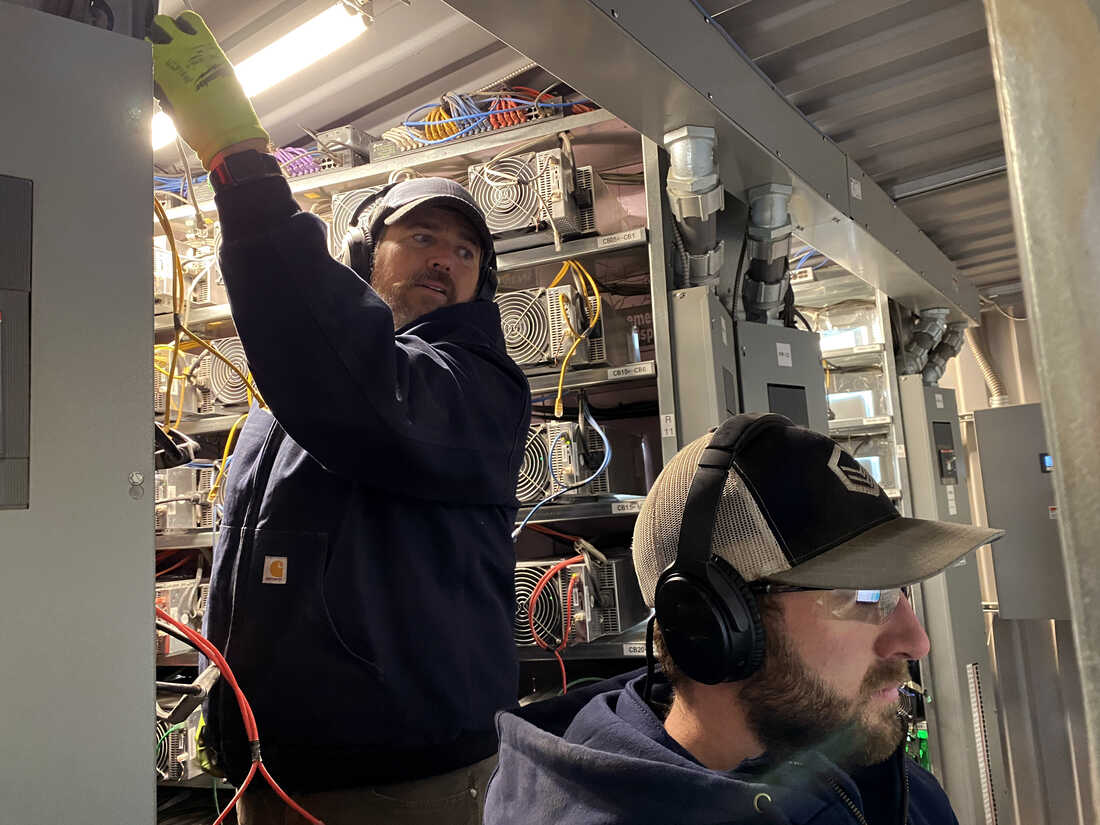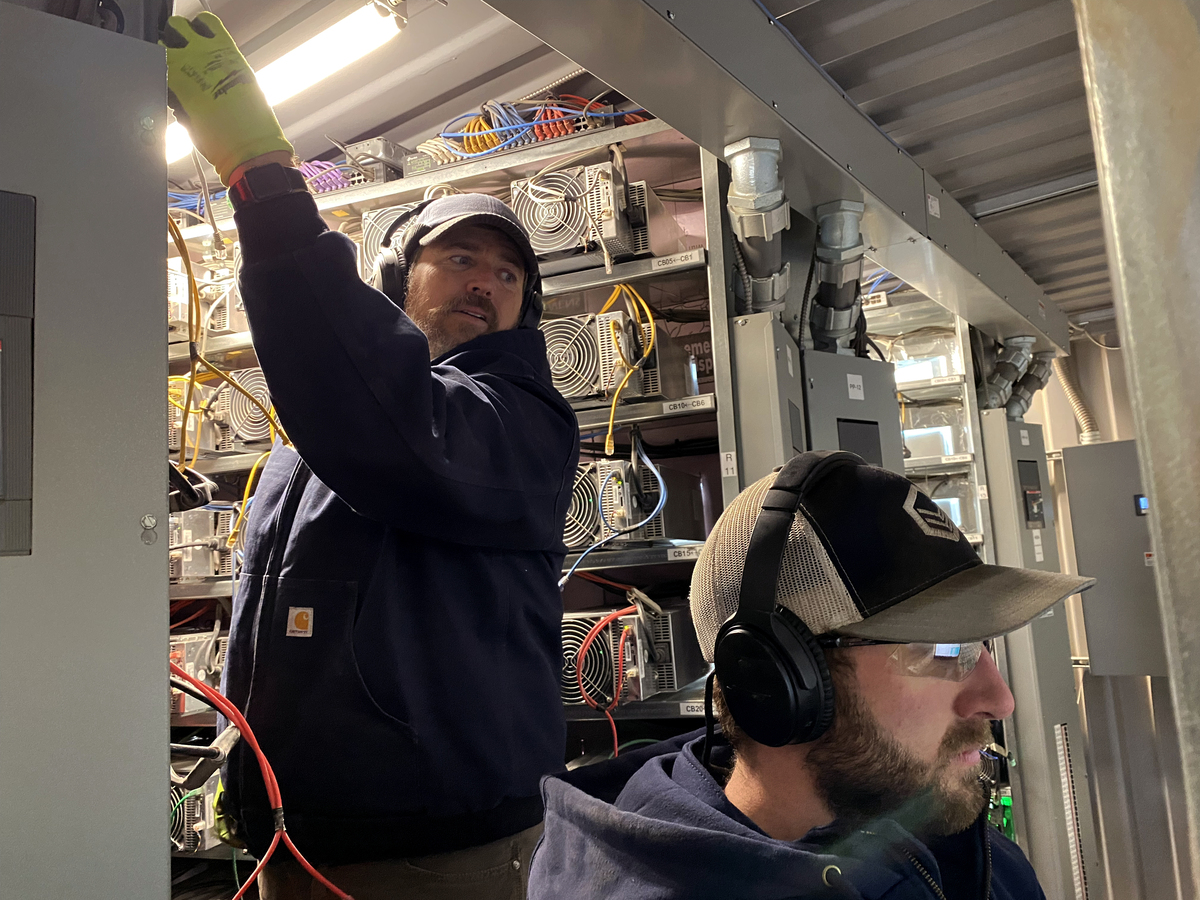A view of the Compute North facility in rural Nebraska.
John Ruwitch/NPR
hide caption
toggle caption
John Ruwitch/NPR

A view of the Compute North facility in rural Nebraska.
John Ruwitch/NPR
In the farmland on the outskirts of Kearney, Nebraska, there’s a field full of modified 40-foot shipping containers lined up in rows. It’s off the main road and easy to miss; there are no signs and no big buildings.
But as you approach, you notice one thing: it makes a lot of noise.
Each container is lined with huge industrial fans, and filled with specialized computers. Inside, it’s windy, and humming at about 85 decibels.
“Our technicians always have some sort of hearing protection when they enter,” says Dave Perrill, CEO and cofounder of Compute North, which runs the facility.
Welcome to one of America’s biggest data centers for cryptocurrency mining.
Here, thousands of computers are dedicated to solving a set of complex math problems that verify blockchain transactions and, in doing so, create bitcoins and other cryptocurrencies. In industry parlance, it’s called mining.
Until the middle of last year, most cryptocurrency mining like this took place in China, where the government has had an on-again, off-again relationship with cryptocurrencies. Last summer, it pulled the plug.
“We’ve certainly heard this news more than once, that China was banning crypto. But we had also heard the rumor so many times and it never came true. So when we first heard this one, we kind of thought the same, right?” says Perrill. “And then suddenly we started getting phone calls.”
The calls were from operations trying to move mining gear — the computers — out of China to set up in the United States. For Compute North, it was a boon.
“We doubled in size,” says Christopher Herbig, lead technician at the facility. “Like, we were busy nonstop for the whole summer. It was just crazy. And there’s just continuing more and more demand all the time.”

Dave Perrill (right), cofounder and CEO of Compute North, and Lars Jorgensen of TAAL Distributed Information Technologies speak during CoinGeek Conference New York in October.
Eugene Gologursky/Getty Images for CoinGeek
hide caption
toggle caption
Eugene Gologursky/Getty Images for CoinGeek
China cracked down on bitcoin mining and transactions last year
Why were all these Chinese bitcoin enthusiasts calling Nebraska? Turns out, big changes were happening in China.
For years, it had been the global hub for bitcoin mining for one simple reason: power was cheap.
For decades, local government had built dozens of hydroelectric dams and wind farms, mostly in remote areas. Regional power grids have yet to connect cities with many of these massive renewable energy projects, a problem called curtailment.
Curtailment meant a good portion of this renewable energy was wasted — until bitcoin miners came along about a decade ago, after bitcoin officially began trading globally.
“We were somehow welcomed by the local Chinese governments, because we can buy electricity from them and we have good incentives to create local jobs,” says Abdullah Han, a Chinese bitcoin miner based in Dubai and the founder of Meer Energy, which sells mining hardware.
Bitcoin mining takes a lot of electricity to power all the computer servers, so crypto entrepreneurs like Han sometimes directly set up data centers in rural Chinese villages to tap into these unused renewable energy sources.
“We enjoy the lowest price of industrial electricity,” says Han. “Local governments would give us an industrial park and within that industrial park, they would give us like a lot of benefit from tax treatment and everything.”
By September 2019, three fourths of bitcoin mining in the world was in China, according to the Cambridge Alternative Finance Benchmarks, a research center run out Cambridge University in Britain. But a backlash was brewing. The Chinese government blamed the unregulated cryptocurrency for an uptick in financial scams and for financing nefarious activity like fraud or ID theft.

A visitor passes by a logo for the e-CNY, a digital version of the Chinese yuan, displayed during a trade fair in Beijing, last September. That same month, China’s central bank declared all transactions involving Bitcoin and other virtual currencies illegal, stepping up a campaign to block use of unofficial digital money.
Ng Han Guan/AP
hide caption
toggle caption
Ng Han Guan/AP
Separately, China’s central bank is also rolling out a state-run digital currency, which it is encouraging its citizens to use.
For years, China had made it hard for people in China to buy and sell bitcoin by forbidding its citizens from registering accounts on cryptocurrency exchanges and shutting down third-party platforms which had provided a workaround. But authorities turned a blind eye to bitcoin miners operating there at the time.
Last May, China banned financial institutions from using cryptocurrencies and vowed to “crack down” on mining. The next month, it banned power generation companies from supplying bitcoin, effectively stopping all mining. China had signaled several times before it would shut down bitcoin mining, only to walk those measures back. This time was different.
“The next day, we already heard of some mining farms being shutting down,” says Chinese miner K.C. Tang, who had operations in China’s Sichuan province and the Xinjiang region. “We start realizing the government was serious.”
In September, China went one step further and banned all onshore bitcoin transactions.
The U.S. is a particularly attractive destination for Chinese bitcoin miners
Thus began what China’s crypto enthusiasts are calling the “great mining migration,” as Chinese mining operations big and small unplug and shift westward.
Tang is trying to find a new country to install his mining hardware, which he estimates in the range of “a few million pieces,” but high shipping costs and legal complexities over importing computing hardware have delayed his plans.
Kazakhstan and Russia are two popular contenders for relocating miners’ bitcoin-making computers because power is cheap, but infrastructure is not great. Tang says he is also concerned Russia could seize his servers.
Despite higher power and labor costs, the United States does have reliable legal protections over private property, Tang says. Elsewhere, he says, “Maybe the governments are not only shutting down the operation, but they also take take all your machines. You might lose everything, so the United States is a safe choice.”
And that’s why a field in Nebraska is now humming with computers.

Workers install cryptocurrency mining computers inside a converted shipping container at the Compute North facility in Nebraska.
John Ruwitch/NPR
hide caption
toggle caption
John Ruwitch/NPR

Workers install cryptocurrency mining computers inside a converted shipping container at the Compute North facility in Nebraska.
John Ruwitch/NPR
Nebraska is one of several U.S. states welcoming foreign bitcoin miners
Almost overnight last summer, China’s share of hashrate — the computing that creates bitcoin — dropped to near nil. And by last fall, the U.S. commanded the biggest share, according to Britain’s Cambridge Center for Alternative Finance.
For Kearney, it’s been a windfall. Until now, the town of roughly 30,000 people was perhaps best known outside Nebraska as a pit stop on I-80, almost exactly halfway between San Francisco and New York.
Mayor Stan Clouse says unemployment is low, the population is relatively young, thanks to the university in town, and land is plentiful.
“We’re fairly diverse in our economic profile. But we felt that technology was one area where we needed to step up, develop a tech park, recruit tech industries,” he says.
After a failed bid to woo an investment by Facebook, the town brought in Compute North, which opened its operations in 2019. By last summer, when crypto miners started fleeing China, it was poised for expansion.
Bureaucratic hangups in China, environmental concerns and infrastructure bottlenecks in the U.S. have slowed the mining migration. But many towns across the U.S. are eager to stand up facilities for miners and craft crypto-friendly regulation. Rockdale, Texas, a small town east of Austin, and Massena, in upstate New York, have already seen a sharp rise in cryptocurrency mining.
Perrill says the migration to the U.S. is good “because one of the criticisms of bitcoin is that it was controlled by China, quote unquote — that if you had over 50% of the hashrate, you could potentially do nefarious things. So the idea that it’s, you know, moved to the U.S. and got even more diversified, I think overall is a good story.”
Compute North employs around a dozen people — cryptocurrency operations aren’t labor intensive. But the facility has helped expand and stabilize Kearney’s power grid. Clouse, the mayor, says it has also boosted the town’s fiscal revenue, allowing for fresh investment in the airport, which he hopes can help propel the economy.
Lamont Black, a finance professor at Chicago’s DePaul University, teaches a course on blockchain — the decentralized ledger technology at the heart of cryptocurrencies. He says the flow of crypto mining to the U.S. will benefit America’s overall blockchain ecosystem, too.
If the coins are minted here, he reasons, it could spur investment and innovation around the underlying technology.
“We’re seeing an institutionalization of crypto that’s becoming more mainstream, more regulated, and I think if we can facilitate that in countries like the U.S., then I think that gives us global competitive advantage,” he says.
And that advantage could be crucial in an industry that proponents think could be as transformative as the internet itself.
John Ruwitch reported from Kearney, Nebraska. Emily Feng reported from Beijing.







